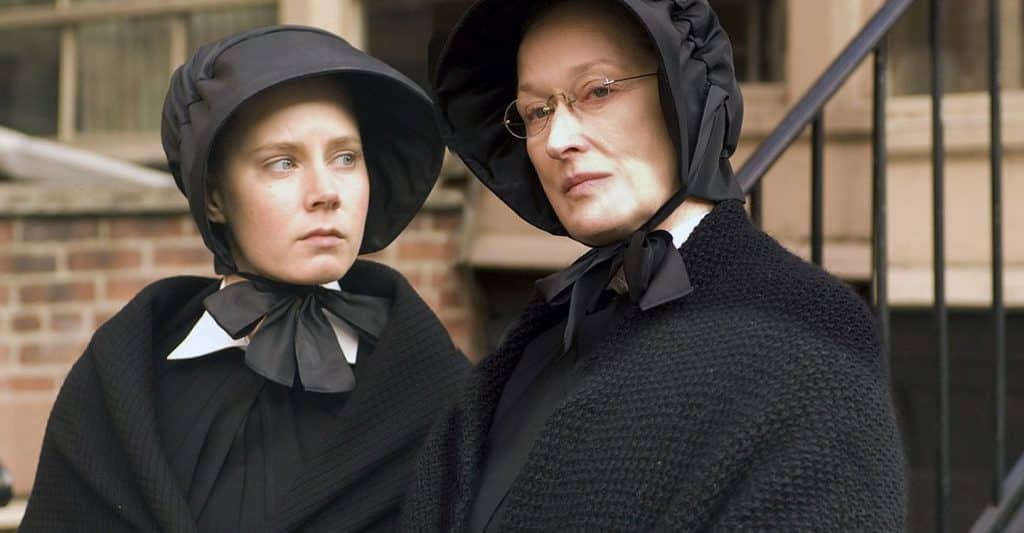Before he passed away at the age of 46, Philip Seymour Hoffman starred in 52 feature films. Starring roles, character pieces, chameleon work—he left a legacy nearly unmatched in both quality and quantity. Now, with P.S.H. I Love You, Jonah Koslofsky wafts through the cornucopia of the man’s offerings.
By late 2008 Philip Seymour Hoffman was on a hot streak. Two years earlier he’d won an Oscar for Capote; next, he took an effective, menacing turn in a big blockbuster. Then he turned in some of his strongest work with Tamara Jenkins on The Savages before co-starring in the final films from both Mike Nichols and Sydney Lumet, legendary filmmakers any actor would’ve killed to collaborate with. He and Charlie Kaufman left it all on the dance floor with Synecdoche, New York, and by the time Doubt rolled around, Hoffman didn’t have to prove he was one of the great actors of the twenty-first century.
The actor spoiled us—maybe that’s why John Patrick Shanley’s priest drama left me a little cold. Set in 1964 at a Catholic school and church in the Bronx, wide-eyed nun Sister James (Amy Adams) feels trapped between her superior, the draconian Sister Aloysius (Meryl Streep); and her parish priest, the relatively hip Father Flynn (Hoffman). Flynn’s charming and personable, addressing his congregation in clear, human tones. The very first words we hear him ask are, “What do you do when you’re not sure?”
But Aloysius does not doubt. She loves the strict nature of her work and not just the power she wields over not just the schoolchildren, but the power over her fellow nuns too. Aloysius rails against ballpoint pens and transistor radios, advising Sister James to keep constant vigilance over her classroom. She hates Father Flynn’s unkempt fingernails and the cubes of sugar he takes in his tea. The world around her is changing. She isn’t.

It’s not long until Sister James does notice something out of the ordinary: Donald Miller (Joseph Foster), the school’s first Black student, is called to Flynn’s office during class. When he returns, she smells alcohol on his breath. Then she spots Flynn placing an undershirt in the kid’s locker. Aloysius is all too happy to jump to conclusions—conclusions an audience would easily jump to as well, considering by the time Doubt released the Catholic Church was reeling from accusations that they had systematically protected priests who abused children.
Adapted from Shanley’s play of the same name, Doubt attempts to cast an air of ambiguity over its central tension: Did Flynn molest Miller? How can James and Aloysius prove it? Cinematographer Roger Deakins doubles down on his usual Dutch angles and obtruding lines bisecting the frame, and this isn’t one of those movies that still feels like it’s stuck on the stage. Once Streep confronts Hoffman, however, Shanley’s directing of actors is on full display in a scene that’s tense, awkward, and all-around engrossing.
But when every character besides Flynn lacks complexity, it’s difficult for the priest to exist in a grey area. And he must for the film to function. We can’t be certain Flynn is innocent; we can’t get proof he’s guilty. Hoffman rides this line as best as he can, allowing Flynn to have moments when you want to root for him and others when he comes off a bit creepy. Still, between the performance and the script, I didn’t have many doubts by the time the credits rolled. That’s not a compliment.
Still, between the performance and the script, I didn’t have many doubts by the time the credits rolled. That’s not a compliment.
Put simply, the film’s leads lack depth. Sister James isn’t just naïve. She’s so thoroughly innocent that you almost can’t believe she recognizes the smell of alcohol. Aloysius is defined by her consistency, her unwavering ideology and devotion to the structures she upholds. I’m not sure Doubt would be a better movie if Adams and Streep tried to muddy their characters with inconsistencies, but as it exists, these phenomenal actresses play people that fit into tight boxes.
This encourages the viewer to apply the same treatment to Flynn, but at the same time, we’re meant to feel uncertain of whatever judgment we make. While Hoffman’s performance maintains that ambiguity, it’s odd to ask the actor to play the film’s only complex character. Perhaps it’s because of the gaze we see him through, but it doesn’t feel like Flynn has a specific psychology that will continue after the movie ends. It’s more of a patchwork, more so snippets of a self.
If one aspect of our lives—or a film—can’t be certain, how can you really be sure of anything else? Or if everything’s clear, how can you really be unsure? Doubt’s not too shabby, but Shanley’s focus is too narrow to truly shake the viewer. Still, I don’t doubt Hoffman and Shanley could have gone much further.